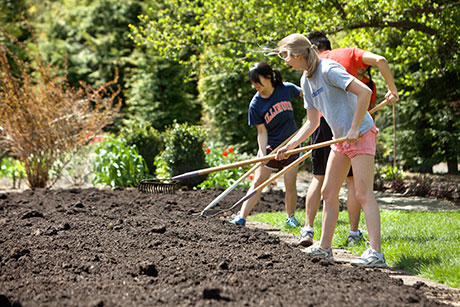Online course aims to put public gardens on a community mission
By Alex Koeberle

Cornell has joined a national online education effort designed to help public garden educators transform their natural assets into community resources for scientific knowledge and social change.
The first online class co-hosted by Cornell, a free six-week online course called EECapacity for Public Garden Educators, wrapped up last month and is part of an ongoing national environmental education training program. Lectures were delivered as a series of live videos, with opportunities for participants to answer questions and provide feedback on Facebook.
Overall course goals included re-evaluating how national educators can engage the public with environmentally conscious and community-centric gardens, according to course developer Donald Rakow, Ph.D. ’87, associate professor of horticulture.
“Courses like this point out realistic and achievable ways that gardens can contribute to more livable and equitable communities,” said Rakow. “Public gardens must move beyond their traditional roles of curating and displaying diverse plant collections and conducting research, education and conservation programs, and truly address the needs of the surrounding communities.”
Reaching out to public garden educators across the country was an exciting part of developing the course, according to Jennifer Schwarz Ballard, associate vice president of education at the Chicago Botanic Garden and an instructor for the series. Part of the success, she said, came by limiting the enrollment to 30 participants. This allowed meaningful feedback and discussion through Facebook, and participants could pose questions, discuss course material and collaborate in a discussion-forum setting.
“I’m optimistic about this technology,” Schwarz Ballard said. “Online communications provide great potential to engage the public and individuals with environmental issues.”
The EECapacity course was designed to incorporate theoretical concepts for meaningful discussion while also showing practical examples of positive changes that have been created in public gardens. Each of three modules focused on a particular topic: green community redevelopment, environmental justice and how to introduce children to climate change.
The latter topic proved a particular challenge, Schwarz Ballard said, and a great example of how this course could succeed.
“The problem with many current curriculums is that climate change is taught as an abstract concept, but climate issues cannot be easily assigned a single explanation,” said Schwarz Ballard.
Effective education, course attendees learned, gets children involved at young ages and must support a scientific framework. Climate change science is complex, but Schwarz Ballard said public garden educators can help kids make connections between their world – what they do every day – and climate-relevant concepts like the seasons and plant responses to ecosystem changes. Children can make everyday connections with the subject by focusing on real-life impacts that they can witness.
This is one way, she said, that public gardens can generate positive changes in their communities.
And that, Rakow said, is why the course was developed. Botanical gardens and arboreta need to be a strong mechanism to provide benefits to communities and the environment. The course teaches educators to rethink the role they and their institutions play.
“Public gardens in general are somewhat insular. They are traditionally thought of for beauty or for their education or conservation efforts, but not for addressing social goals,” Rakow said. “For public gardens to be relevant in the 21st century, we need to look beyond garden gates and impact broader communities.”
EECapacity and Cornell University are linked through a five-year cooperative agreement between the United States Environmental Protection Agency and Cornell’s Civic Ecology Lab, led by Marianne Krasny, professor of natural resources. EECapacity for Public Garden Educators was co-sponsored by the American Public Gardens Association.
Full video lectures from each module are available to the public on EECapacity and American Public Gardens Association.
Alex Koeberle ’13 is a freelance writer for the College of Agriculture and Life Sciences.
Media Contact
Get Cornell news delivered right to your inbox.
Subscribe